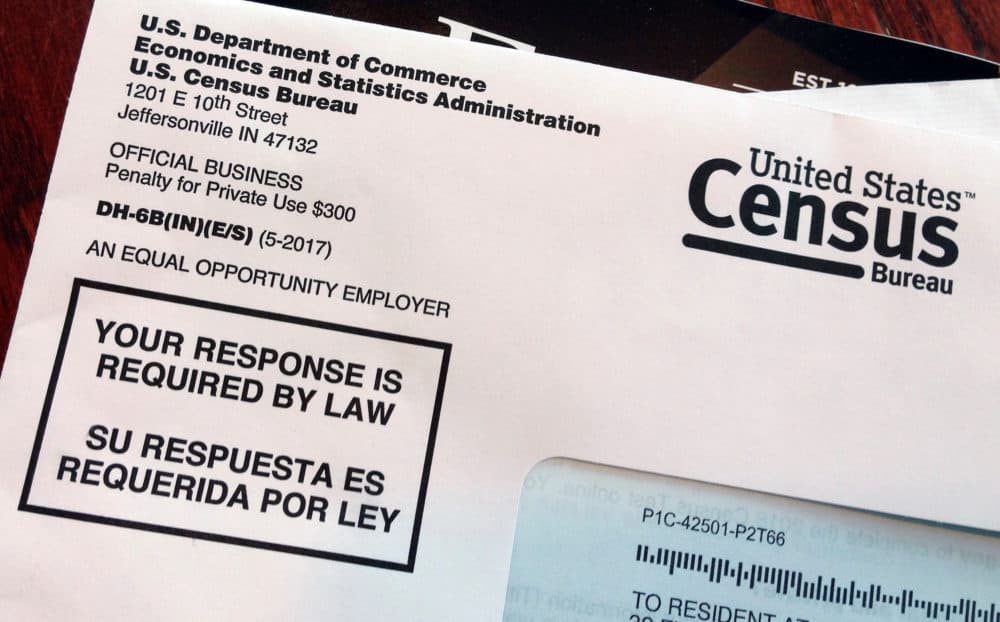Advertisement
Mass. Nonprofits Unite To Counter Census Fears
Resume
Members from an array of organizations gathered at the library in East Boston Monday with a unified goal: to make sure people in their respective communities respond to the 2020 Census. It's an important decennial event that determines how much money and how much political representation Massachusetts is entitled to get.
It’s a common theme at the turn of a decade, but this time around, community-based advocates for the census say the job could be significantly harder than it was in 2010. That’s because the Trump administration is fighting to put a citizenship question on the census.
“Given our current political climate, we’re honestly feeling like everybody is going to be hard to count because what we see is another factor: deep distrust of government,” said Alexie Torres, head of the Massachusetts Census Equity Fund.
The fund’s purpose is to provide grants to community groups across the state who can use the monies to raise awareness around the importance of the survey.
Torres said the fund has $1.25 million in the bank, most designated for local nonprofits to work on getting a good census response from communities “that are hard to count," including communities of color, children, the elderly and the disabled.
Census data has big ramifications for states. Not only is congressional representation determined (Massachusetts lost a seat in the 2010 count), but also the amount of money a state receives from the federal government.
Boston officials estimate that for every person that doesn’t fill out the census, the state loses roughly $2,400 in federal dollars each year — for a decade. And according to the U.S. Census Bureau, in 2010, nearly 20,000 children ages 0 to 4 were not counted in Massachusetts.
Torres says that’s a big part of why philanthropic groups are willing to invest in boosting the census count instead of other causes.
"Whether it's jobs, whether it's housing, there's not an area that philanthropy touches that is not impacted in some way by the census,” Torres said. "Even if it's simply the fact that they get their data and their information on where the needs are in their communities."
The Massachusetts Nonprofit Network estimates Massachusetts receives more than $16 billion in federal funding solely on the basis of census data.
"These programs include Medicare, Medicaid, SNAP, affordable housing, public education — really just a wide swath of programming that directly impacts the people that nonprofits serve,” said the group’s Fernando Martinez.
One of the strongest advocates for a big census turnout is Boston Mayor Marty Walsh, who says that on top of the political and financial implications, census data will be a way to gauge the success of some of his policies — like whether housing production under his administration is having an impact on displacement.
“It's a great tool and great data to use to see how you're doing, and compare data to other cities and towns across America to see how they're doing in similar situations, whether it's gentrification and displacement, or success on the positive side,” Walsh said.
The Trump administration says it wants the citizenship question on the census to enforce parts of the Civil Rights Act, and the Supreme Court is set to hear the case later this month. Opponents say that could make it extremely difficult to convince people in the country illegally to complete the census.
Regardless of the outcome, New York Regional Census Director Jeff Behler said respondents are never identified.
"We cannot release information that identifies a household or individual to anyone, no administration, no Homeland Security, no federal, state, local agency, no law enforcement agency, no one,” Behler said, adding that he could be hit with fines and jail time for divulging such information.
"The only data we release is statistically summarized data,” he said.
Should the citizenship question make it onto the census, there is another option, says Keith Goralski, a census official: Simply leave the question blank.
This segment aired on April 1, 2019.
